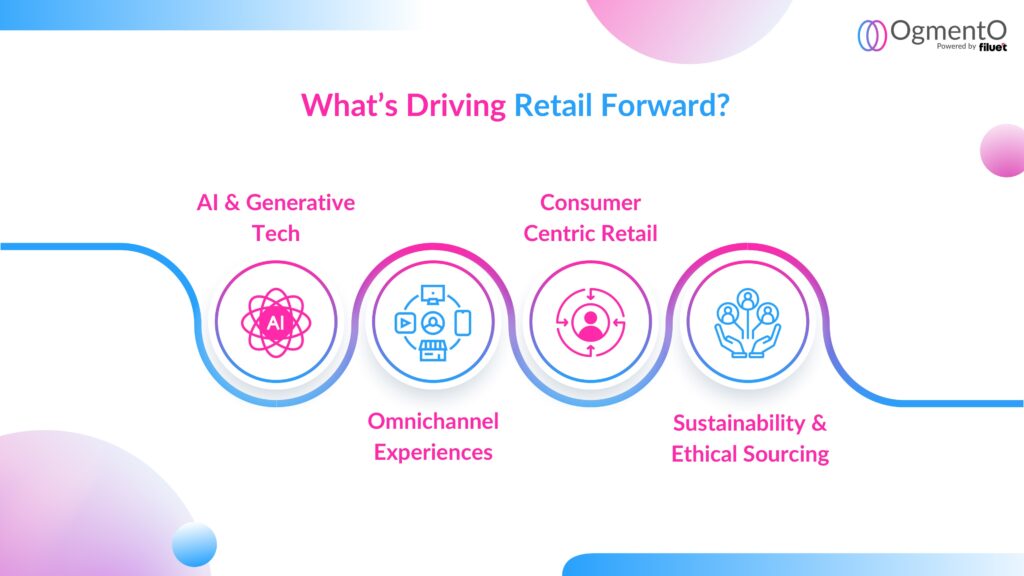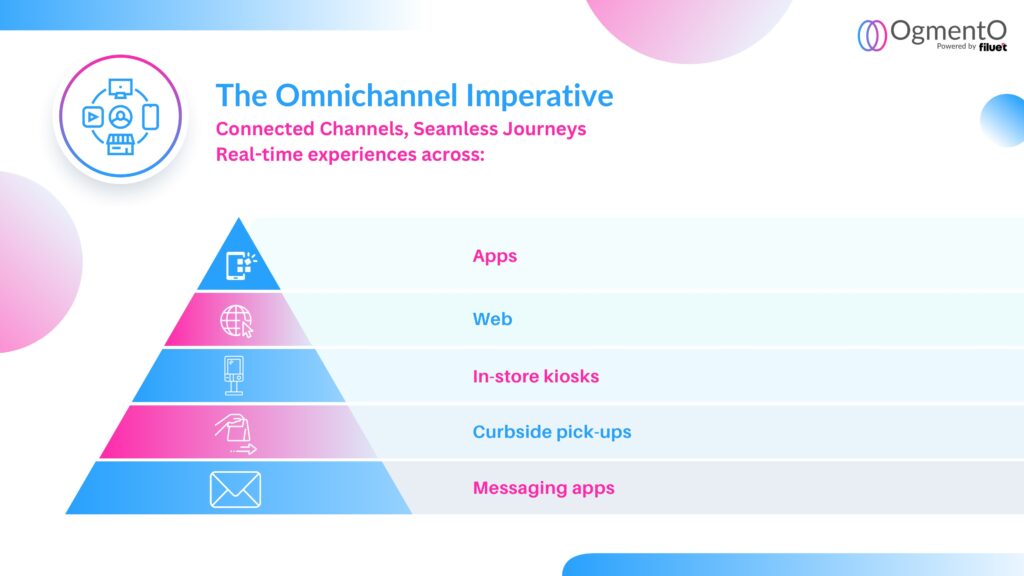The Great India Retail Summit 2025: A Glimpse into Retail’s Future
The Great India Retail Summit (GIRS) 2025, organised by ET Retail, took place on the 20th and 21st of February 2025 at the Jio World Convention Centre in Mumbai. This prominent event served as a convergence point for Industry business leaders and pioneers in the retail sector, focused on charting the course for the industry’s next phase through groundbreaking innovations and transformative insights.
GIRS 2025 offered the opportunity to witness a significant paradigm shift in retail with thought-provoking discussions, fostering meaningful collaborations aimed at shaping a progressive future for the industry.
The summit’s agenda was structured around five dynamic conventions, each delving into a crucial aspect of retail’s ongoing transformation. These included
- Retail Excellence Discussion, which explored leadership strategies and best practices
- ShopperTech Symposium, showcasing the latest technological innovations
- Omnichannel Convention, redefining customer engagement through unified experiences
- Retail Experience Summit, focused on enhancing customer interactions
- Retail Mela, a hub for entrepreneurial activity.
Industry experts engaged in deliberations on vital topics, such as the projections for the next decade of retail, the increasing significance of non-metropolitan areas, the burgeoning beauty sector, the changing nature of consumption, the future of luxury retail in India, the direct-to-consumer (D2C) journey and the transformative role of Artificial Intelligence (AI) in supply chain.
The first day of GIRS 2025 concluded with significant revelations and industry-shaping discussions, with a strong emphasis on the role of technology, the implementation of omnichannel strategies, and the evolving dynamics of consumer behaviour.
Key Trends Shaping the Future of Retail
Technological Innovations
From inventory management to customer interactions, AI is deeply ingrained in fundamentally reshaping every aspect of modern-day retail.
As market experts expressed at the Summit, the next 10 years will witness the evolution of AI’s role in hyper-personalization, heavily tailored recommendations, and simplification of decision-making processes through deep insights into consumer behaviour and demands.
Generative AI is expected to continue impacting the sector by enabling innovative shopping experiences powered by intelligent virtual assistants that can engage with customers in real-time with a human touch. This evolution positions AI as a foundational shift in retail, with widespread adoption promising to deliver enhanced CX and operational efficiency.
Robotics is also playing a game-changing role in boosting efficiency. The retail sector is predicting a rise in autonomous retail operations, including the emergence of cashier-less stores, deployment of remotely monitored inventory robots, and comprehensive warehouse automation. The aim is to reduce manual intervention while remedying labour shortages, rising operational costs, and expediting store-to-door processes.

Omnichannel Strategies
The future of retail increasingly belongs to ‘phygital’ businesses that can seamlessly blend the digital and physical aspects of shopping, creating highly adaptive and personalised experiences for customers across all points of interaction. Notably, customers who engage with retailers through multiple channels demonstrate significantly higher CLV in comparison with single-channel shoppers. In GIRS 2025, enhancement of the omnichannel experience was identified as a key growth area.
Successful omnichannel implementations mentioned in the summit included
- Target’s Drive Up with Apple CarPlay for a smooth and convenient curb-side pickup experience
- Zara’s real-time inventory tracking and mobile-first approach allow customers to reserve items online and collect their orders in-store through kiosks.
- JioMart’s unified ecosystem covering websites, mobile apps and WhatsApp orders
- Reliance Digital’s “Click & Reserve” feature allows customers to browse products online and pick them up at a physical store at their convenience.
Consumer Behavior Shifts
From the perspective of Harshvardhan Neotia, Chairman of Ambuja Neotia Group, ‘malls are no longer just shopping destinations but multidimensional consumer ecosystems’.
This decade witnesses a growing demand for entertainment, dining, and activity-based retail concepts. Shoppers expect seamless omnichannel experiences, immersive retail environments, and innovations that effectively merge the best of the digital and physical worlds. Therefore, consumers are more likely to return to retailers that offer personalised and immersive experiences than those that don’t.
Retail executives survey also anticipates that consumers will increasingly favour :
- spending on experiences rather than solely on goods.
- higher quality in goods/services and better value for their money
- immersive hyper-personalized recommendations and purchase experiences
These shifts indicate that modern consumers are looking for experiences, convenience, personalisation, and value, pushing retailers to move beyond traditional sales models.
Insights from Industry Leaders at GIRS 2025
Industry leaders at GIRS 2025 provided valuable insights into the future of retail, particularly regarding the adoption of AI, sustainable practices and strategies for future-proofing businesses.
Adoption of AI and Machine Learning
Discussions at GIRS 2025 highlighted the growing impact of AI on inventory management and customer engagement. AI-powered solutions took center stage at the summit, where industry experts highlighted their growing importance in optimizing inventory and enhancing customer interactions through data-driven insights. Widely recognized as a key enabler of operational efficiency and improved customer experience in the years ahead, the showcased technologies demonstrated the practical impact and advantages of AI in modern retail environments.

The key point revolved around AI and ML as critical tools for optimising core retail functions, such as ensuring the right products are available at the right time and enhancing customer engagement through the application of data-driven insights.
Sustainable Retail Practices
Sustainability and ethical sourcing were key discussion points at GIRS 2025 owing to ever-increasing consumer demand for responsible practices, the growing importance of ethical retailing, and the circular economy. Brands are thus focusing on reducing food waste, ensuring product traceability, using eco-friendly products/packaging materials, and implementing take-back programs.
This growing emphasis suggests that sustainability is transitioning from a peripheral concern to a central tenet of retail strategy, driven by both consumer awareness and a growing sense of ethical responsibility within the industry.
Future-Proofing Retail Businesses
Industry leaders at GIRS 2025 emphasised the importance of creating strong brand identities, innovative customer engagement strategies and the use of technological innovations to stay relevant and competitive in the long run.
The GIRS 2025 underscored the need for retailers to focus on convenience, sustainability, and immersive customer experiences by integrating with technological advancements within the sector. Adaptability and resilience are crucial for navigating market changes and disruptions. Proactive approaches, including predictive analytics and scenario planning, have been further pinpointed as essential for mitigating risks.
Case Studies Presented at GIRS 2025
While specific case studies from GIRS 2025 weren’t detailed, broader examples illustrate successful strategies in digital transformation and customer-centric approaches within the Indian retail sector.
Digital Transformation Success Stories
Several Indian retailers have successfully implemented digital tools. Reliance Retail has adopted an omnichannel strategy with JioMart and uses data analytics for personalisation and inventory management. Flipkart uses AI to make personalised recommendations and optimise inventory. Tata CLiQ has integrated online and offline experiences using AI for logistics and customer service. Aditya Birla Fashion and Retail Limited partnered with Accenture to implement an ERP system for streamlined processes and better data visibility. These examples highlight the importance of strategic digital adoption.
Customer-Centric Approaches
Various brands are enhancing customer loyalty through innovative loyalty programs and personalisation. Myntra’s “Insider” program offers exclusive rewards and early access. Flipkart’s VIP program provides extra benefits like SuperCoins and faster returns. RelianceOne allows earning and redeeming points across Reliance Retail outlets. Nykaa’s focus on personalised and immersive experiences has led to high customer return rates. Rewarding loyalty and providing personalised experiences are key to building strong customer relationships.
Challenges and Opportunities Ahead
The retail industry faces both challenges and opportunities as it continues to evolve, particularly in navigating supply chain disruptions and embracing e-commerce growth.
Navigating Supply Chain Disruptions
Given current geopolitical and economic uncertainties, supply chain resilience is paramount. The GIRS 2025, thus, highlighted the importance of building resilient supply chains for retailers to mitigate risks. Industry experts mentioned key strategies, including diversifying suppliers and optimising networks using digital twin technology. AI-powered predictive analytics can further help analyse demand data and adjust inventory to minimise disruption impacts.
Embracing E-commerce Growth
Finding the right balance between physical stores and online platforms is essential for future success. Seamlessly integrating digital and physical experiences is key to meeting evolving consumer preferences. Physical stores need to become more immersive, focusing on customer interaction while delivering highly adaptive and personalised experiences that anticipate customer needs across all touchpoints, thereby breaking down the traditional barriers between online and offline channels.
In the blossoming Indian e-commerce market that is projected to $550 billion by 2035, a blended approach leveraging both online and offline strengths is vital for capitalising on profound growth opportunities.
Embracing the Future of Indian Retail
The 2-day Great India Retail Summit 2025 provided valuable insights into the future trajectory of the retail sector in India. Key trends highlighted in the Summit include
- pervasive adoption of AI, ML, robotics and automation across various retail functions,
- critical importance of seamless omnichannel integration to meet evolving consumer expectations,
- significant shifts in consumer behaviour towards immersive experiences and hyper-personalisation,
- a growing emphasis on sustainable and ethical practices.

The summit also underscored the substantial growth potential of the Indian retail market, with e-commerce poised for exponential expansion in the coming decade.
To thrive in this dynamic and rapidly changing landscape, retailers are encouraged to embrace the strategies discussed at GIRS 2025, such as strategic investments in technology, especially AI, ML, and retail automation, to enhance efficiency and personalisation.
Creating unified and seamless omnichannel experiences will be crucial for engaging consumers, especially Gen Z and Millennials, who expect value, consistency, and convenience across all touchpoints. Retailers must also prioritise building strong customer loyalty through tailored offerings and rewarding programs.

